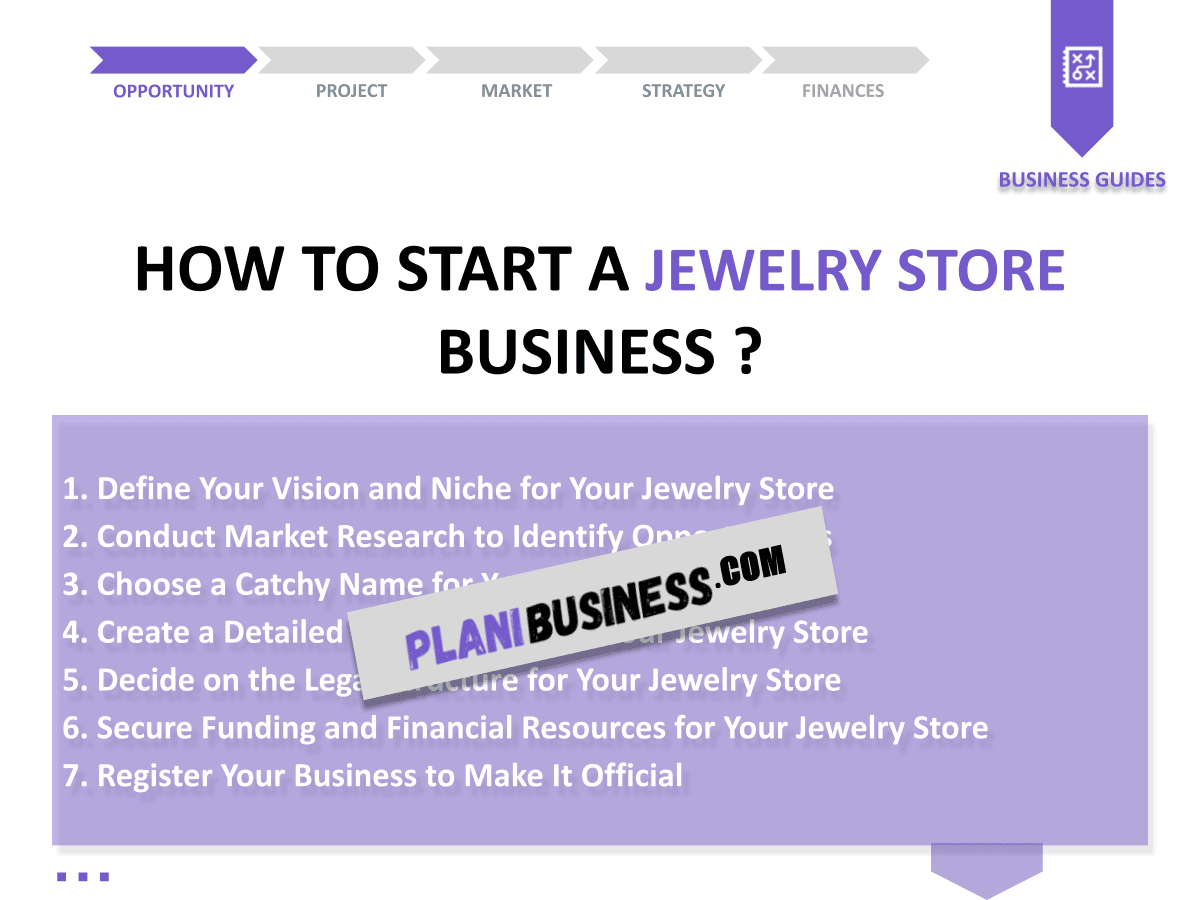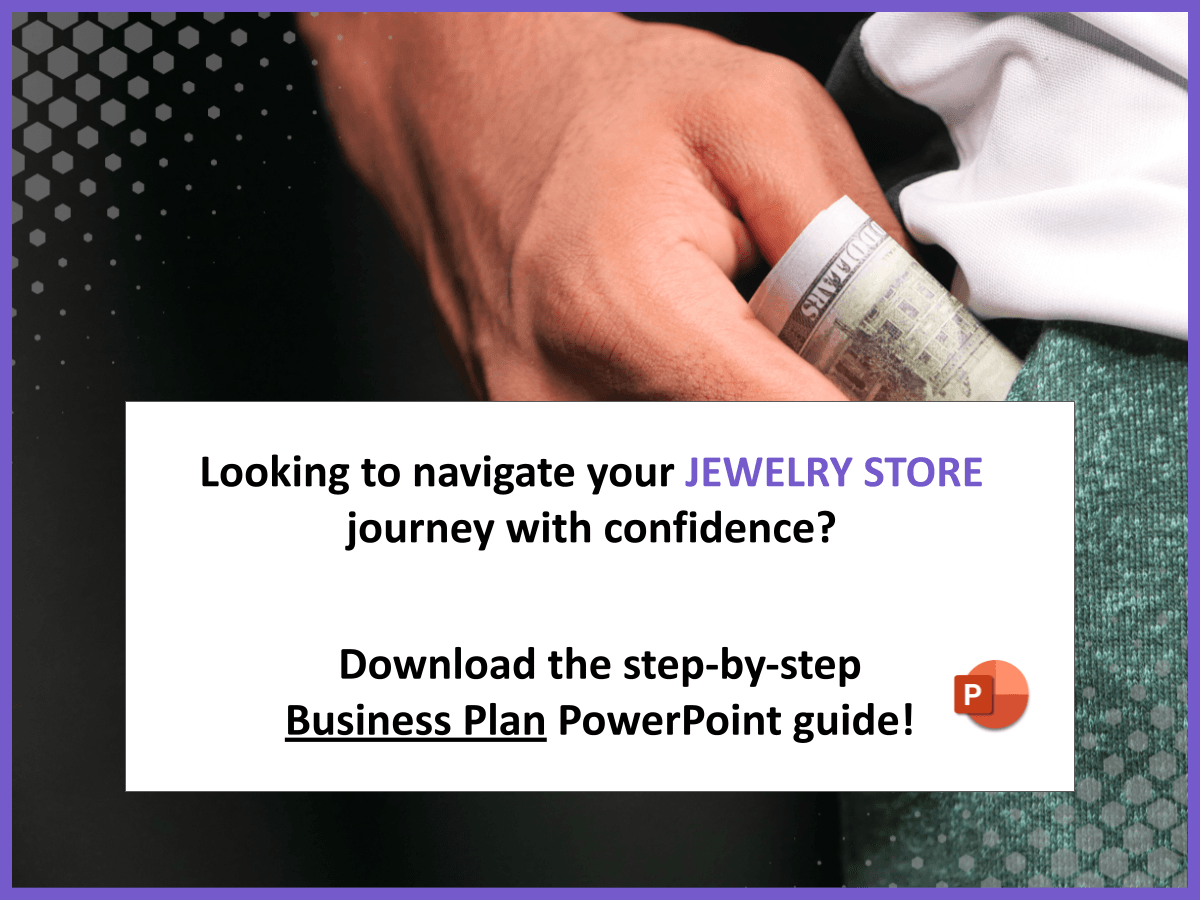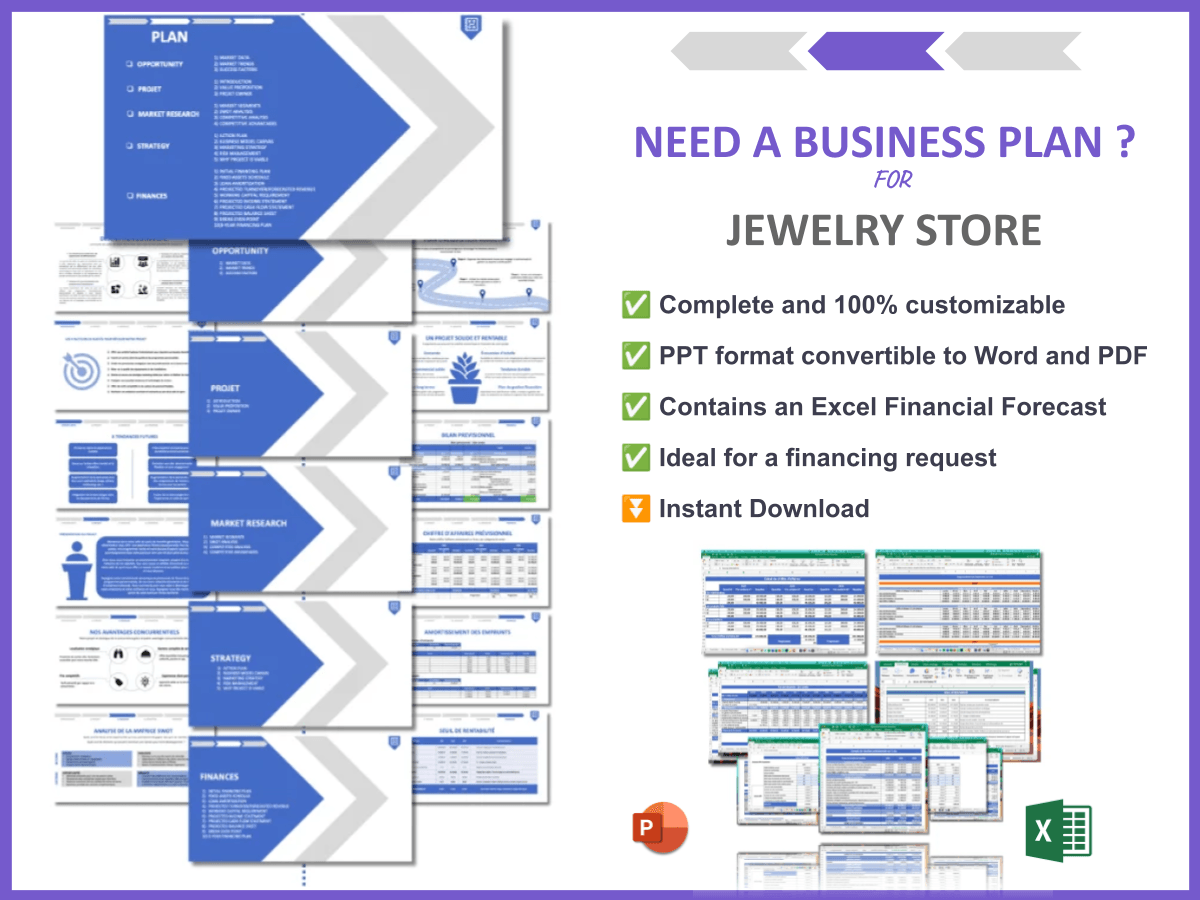Are you thinking about starting a jewelry store? You’re not alone! The jewelry industry is booming, with sales projected to grow significantly over the next few years. In fact, it’s estimated that the global jewelry market will reach over $480 billion by 2025. That’s a staggering number! This article will guide you through the essential steps on how to start a jewelry store, helping you navigate everything from defining your niche to marketing your business effectively.
In this guide, we’ll cover:
- How to define your vision and niche.
- Conducting market research to identify opportunities.
- Choosing a catchy name for your jewelry store.
- Creating a detailed business plan.
- Deciding on the legal structure for your business.
- Marketing and advertising your jewelry store.
1. Define Your Vision and Niche for Your Jewelry Store
Starting with a clear vision is crucial when you’re figuring out how to start a jewelry store. What type of jewelry do you want to sell? Is it handmade, luxury, or something unique? Finding your niche is essential because it helps you stand out in a crowded market.
First off, consider your personal style and interests. Do you love vintage pieces, or are you more into modern designs? Think about what excites you and where your passion lies. This can make a huge difference in your business journey.
Next, research popular jewelry trends. You can browse social media platforms like Instagram and Pinterest to see what styles are gaining traction. Pay attention to what influencers and designers are showcasing; this can give you insight into what customers might be looking for.
Finally, identify your target market and their preferences. Are you aiming at young adults looking for trendy pieces, or perhaps older customers seeking timeless elegance? Knowing who you’re selling to can guide your design choices and marketing strategies.
2. Conduct Market Research to Identify Opportunities
Understanding the market landscape is key when learning how to start a jewelry store. You need to know what you’re up against. Look into your competitors and analyze their strengths and weaknesses. This can provide valuable insights into how you can position your store effectively.
| Competitor | Strengths | Weaknesses |
|---|---|---|
| Competitor A | Strong online presence and brand recognition | High prices may deter budget-conscious customers |
| Competitor B | Unique designs that attract a niche market | Limited marketing efforts lead to lower visibility |
After gathering information about your competitors, it’s time to assess the opportunities available in the market. Look for gaps that you could fill with your unique jewelry offerings. For example, if there’s a lack of eco-friendly jewelry stores in your area, that might be a niche worth exploring.
Don’t forget to consider current market trends as well. Are there particular styles or materials that are gaining popularity? This can help you tailor your product offerings to meet customer demands.
3. Choose a Catchy Name for Your Jewelry Store
The name of your jewelry store is your brand’s first impression. It’s vital to make it memorable and relevant! A catchy name can attract customers and set the tone for your business.
Start by brainstorming several options. Think about words that resonate with your jewelry style, like “elegance,” “sparkle,” or “artisan.” Consider using names that reflect your niche, such as “Vintage Treasures” for antique jewelry or “Eco Gems” for sustainable pieces.
Next, check the availability of your chosen names. Make sure the domain for a website is available, as having an online presence is crucial in today’s market. You can use tools like GoDaddy or Namecheap to see if your desired domain is free.
Once you have a shortlist, get feedback from friends, family, or potential customers. Sometimes, an outside perspective can help you see things differently. They might have insights on how your name resonates or if it’s easy to remember.
4. Create a Detailed Business Plan for Your Jewelry Store
A business plan is essential for guiding your store’s growth and is a critical step in how to start a jewelry store. It outlines your goals, strategies, and financial projections, which can be especially helpful if you’re seeking funding.
Here’s a quick rundown of what to include in your business plan:
- Executive Summary: A brief overview of your business idea and goals.
- Market Analysis: Insights from your market research, including target audience and competitors.
- Marketing Strategy: How you plan to promote your jewelry store.
- Operational Plan: Details on how your business will operate daily.
- Financial Projections: Expected income, expenses, and funding needs.
I recommend checking out this business plan template for Jewelry Store. It’s super detailed and can save you a ton of time!
Remember, your business plan isn’t set in stone. As you progress and learn more about your market and customers, be prepared to adapt your plan. Flexibility can be a key factor in your jewelry store’s success.
5. Decide on the Legal Structure for Your Jewelry Store
Choosing the right legal structure for your jewelry store is crucial as it affects your taxes, liability, and operational flexibility. There are several options to consider when figuring out how to start a jewelry store.
Here are some common legal structures:
- Sole Proprietorship: This is the simplest structure, where you alone own the business. It’s easy to set up but offers no personal liability protection.
- Limited Liability Company (LLC): An LLC protects your personal assets from business debts while providing flexibility in management. This is a popular choice for many small business owners.
- Corporation: This structure is more complex and suitable for larger businesses. It offers the highest level of personal liability protection but comes with more regulatory requirements.
Before making a decision, consult with a legal expert to ensure you choose the best structure for your unique situation. Each option has its pros and cons, so understanding the implications is key to your business success.
6. Secure Funding and Financial Resources for Your Jewelry Store
Determining how much money you need to start and sustain your business is a significant step in how to start a jewelry store. Look into various funding options to cover initial costs such as inventory, marketing, and operational expenses.
Here are some common funding sources:
| Funding Source | Pros | Cons |
|---|---|---|
| Bank Loans | Structured repayment plans and potentially lower interest rates. | May require collateral and a solid credit history. |
| Personal Savings | No repayment required and full control over your business. | Risking personal finances can be stressful. |
| Investors | Access to larger sums of money and potential mentorship. | Loss of some control over your business decisions. |
Consider creating a detailed budget that outlines your expected expenses and how much funding you’ll need. This can help you make informed decisions about which funding sources to pursue. Remember, securing funding is about finding the right balance between investment and control.
7. Register Your Business to Make It Official
Once you’ve settled on your business name and legal structure, it’s time to register your business to make it official. This is a vital step in how to start a jewelry store as it establishes your brand and protects your business name.
Here’s a simple checklist for registering your jewelry store:
- Choose Your Business Name: Ensure it’s unique and reflects your brand identity.
- File the Necessary Paperwork: Depending on your chosen legal structure, you may need to file specific forms with your state or local government.
- Get an Employer Identification Number (EIN): This is essential for tax purposes, especially if you plan to hire employees.
After registration, you’ll receive documentation confirming your business is legally recognized. Keep this paperwork in a safe place, as you may need it for opening bank accounts or applying for loans.
8. Obtain Necessary Tax Identification Numbers, Licenses, and Permits
Depending on your location and the type of jewelry you’re selling, you may need various licenses and permits to operate legally. This step is crucial in ensuring your business complies with local regulations.
Start by researching the specific requirements for your area. Here are some common items to consider:
- Sales Tax Permit: If you plan to sell products, most states require a sales tax permit to collect sales tax from customers.
- Business License: Check with your local government to see if a general business license is necessary.
- Special Permits: If you’re selling certain types of jewelry, like precious metals or stones, you might need additional permits.
It’s also wise to obtain a resale certificate if you plan to purchase inventory from wholesalers. This certificate allows you to buy goods tax-free if you intend to resell them.
Always stay informed about the regulations in your area, as laws can change. Consult with a legal professional if you’re unsure about what licenses and permits you need. This will help ensure your jewelry store operates smoothly from the start.
9. Apply for Business Insurance Coverage for Your Jewelry Store
Protecting your investment with business insurance is crucial when considering how to start a jewelry store. Jewelry stores face unique risks, including theft, damage, and liability claims. Having the right insurance can save you from significant financial losses.
Here are some types of insurance you should consider:
- General Liability Insurance: This covers claims of bodily injury or property damage that may occur on your premises.
- Property Insurance: Protects your physical assets, including your inventory, displays, and equipment, against theft or damage.
- Professional Liability Insurance: This can protect you if a customer claims that your jewelry did not meet their expectations or caused harm.
To find the right coverage, it’s a good idea to consult with an insurance agent who specializes in retail or jewelry businesses. They can help you assess your risks and choose the best policies for your specific needs.
| Type of Insurance | Coverage | Importance |
|---|---|---|
| General Liability | Bodily injury, property damage | Essential for protecting against lawsuits |
| Property Insurance | Loss or damage to inventory | Critical for safeguarding your assets |
| Professional Liability | Claims of negligence | Important for maintaining trust with customers |
10. Set Up Your Financial Management Systems
Keeping your finances organized is key to running a successful jewelry store. Setting up effective financial management systems helps you track income, expenses, and profits, ensuring your business remains financially healthy.
Here are some steps to consider:
- Invest in Accounting Software: Tools like QuickBooks or FreshBooks can help you manage your finances more efficiently. They allow you to track sales, expenses, and generate financial reports.
- Separate Business and Personal Finances: Open a dedicated business bank account to avoid mixing your personal and business finances. This makes accounting easier and protects your personal assets.
- Set Up a Budget: Create a budget that outlines your expected income and expenses. Regularly review and adjust it as needed to keep your finances on track.
Consider hiring a bookkeeper or accountant, especially if you’re not comfortable managing finances yourself. A professional can provide valuable insights and help you stay compliant with tax laws, giving you peace of mind to focus on growing your jewelry store.
11. Establish Your Brand Identity for Your Jewelry Store
Your brand is how customers perceive you, and it plays a vital role in how to start a jewelry store. Creating a strong brand identity helps differentiate your business from competitors and builds customer loyalty.
Here are some key elements to consider when establishing your brand:
- Logo Design: Your logo should be memorable and reflect the essence of your jewelry store. Consider hiring a professional designer or using online tools like Canva to create one.
- Color Scheme: Choose colors that resonate with your target audience and reflect your brand’s personality. For example, soft pastels might appeal to a younger crowd, while deep jewel tones could attract a more sophisticated clientele.
- Brand Voice: Define how you communicate with your customers. Whether it’s friendly and casual or elegant and professional, maintaining a consistent voice across all platforms is crucial.
Once you’ve established these elements, apply them consistently across your website, social media, and marketing materials. This helps create a cohesive brand experience that customers will recognize and trust.
12. Develop a Professional Website for Your Jewelry Store
In today’s digital age, having an online presence is non-negotiable. A professional website showcases your products and tells your brand story, making it an essential step in how to start a jewelry store.
Here are some key features your website should include:
- High-Quality Images: Invest in professional photography to showcase your jewelry. Clear, attractive images can significantly impact purchasing decisions.
- Easy Navigation: Ensure your website is user-friendly. Organize your products into categories, making it easy for customers to find what they’re looking for.
- Secure Payment Options: Provide multiple payment options, including credit cards and PayPal, to cater to different customer preferences. Make sure your website has SSL certification for secure transactions.
Additionally, consider adding a blog section to share jewelry care tips, style guides, or behind-the-scenes stories about your brand. This not only provides value to your customers but can also improve your search engine rankings.
13. Market and Advertise Your Jewelry Store
Getting the word out is vital for success when learning how to start a jewelry store. Utilize a mix of online and offline marketing strategies to reach your target audience effectively.
Here are some marketing ideas to consider:
- Social Media Marketing: Platforms like Instagram and Pinterest are perfect for showcasing your jewelry. Post high-quality images, engage with followers, and use relevant hashtags to increase visibility.
- Email Marketing: Build an email list and send regular newsletters featuring new products, promotions, and exclusive offers. This keeps your brand top-of-mind for customers.
- Local Events: Participate in local craft fairs, trade shows, or community events. These provide opportunities to showcase your jewelry and connect with potential customers face-to-face.
Don’t forget to track your marketing efforts. Use tools like Google Analytics to see which strategies drive traffic and sales. This will help you refine your approach and focus on what works best for your jewelry store.
By combining these strategies, you’ll be well on your way to establishing a successful jewelry store that resonates with customers and stands out in the market.
Conclusion
Starting a jewelry store can be an exciting and rewarding journey. By following the steps outlined in this article, you’ll be well on your way to building a successful business that reflects your passion for jewelry. Remember, the key is to stay focused on your vision and adapt to the market’s needs.
For further insights, I encourage you to check out our articles on how to create a SWOT Analysis for Jewelry Store and learn How to Initiate a Jewelry Store Marketing Plan? With Example. These resources can provide valuable strategies to help you navigate the jewelry business landscape effectively. Happy selling!
FAQ
- What are the initial costs of starting a jewelry store?
Initial costs can vary widely depending on location, inventory, and business model. Generally, you should budget for inventory, insurance, permits, and marketing. - How can I find suppliers for my jewelry store?
Research online directories, attend trade shows, or connect with local artisans. Building relationships with suppliers can lead to better pricing and unique inventory. - What type of jewelry should I sell?
Consider your interests and market demand. Options include handmade, vintage, luxury, or costume jewelry. Identifying a niche can help you stand out. - Do I need a business license to sell jewelry?
Yes, most locations require a business license. Additionally, check for any specific permits related to jewelry sales, such as sales tax permits. - How can I effectively market my jewelry store?
Utilize social media, email marketing, and local events to promote your store. Engaging with your audience online and offline can significantly increase visibility. - What is the best way to price my jewelry?
Consider your costs, market trends, and competitor pricing. A common method is to mark up the cost of materials by a certain percentage, typically 2-3 times. - How can I create a brand identity for my jewelry store?
Develop a unique logo, choose a consistent color scheme, and establish a clear brand voice. Consistency across all platforms helps build recognition. - What insurance do I need for my jewelry store?
Common types include general liability, property insurance, and professional liability insurance. Consult with an agent to tailor coverage to your needs. - How important is an online presence for a jewelry store?
An online presence is crucial for reaching a wider audience. A professional website and active social media profiles can drive traffic and sales. - What are the benefits of having a business plan?
A business plan provides direction, helps secure funding, and outlines your strategies for success. It’s a roadmap that can adapt as your business grows.







